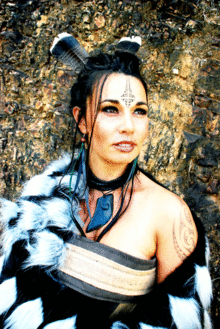
To Māori, women are te
whare tangata – the house of humanity – and are venerated for their ability to
create life. Many strong women have been prominent in Māori society, including
the Māori queen, Dame Te Ātairangikaahu, and land-rights activists Eva Rickard
and Whina Cooper.
The Short Story
A quick, easy summary
Read the Full Story
Māori call women ‘te
whare tangata’ (the house of humanity), and respect them for their ability to
create life.
Goddesses
Wāhine atua (goddesses)
in Māori tradition include:
Papatūānuku, the earth
mother and creator of all life
Hineahuone, the first
woman
Hinetītama, who fled to
the underworld and became Hine-nui-te-pō, the goddess of death, when she
realised that her husband, Tāne, was also her father
the women who feature
in the deeds of the demigod Māui.
Tapu and noa
Traditionally,
menstruating women were seen as tapu (sacred or restricted). They stayed away
from food storage areas and gardens, and did not associate with men.
Women had the ability
to whakanoa (remove tapu). They took part in whakanoa ceremonies for new
buildings, and for warriors returning from battle.
Women of rank
First-born girls in
chiefly families were seen as tapu. Their status as puhi (virgins) was guarded
by their hapū, so they could marry a suitable man from another community. Some
women of mana received moko kauae (female chin tattoos).
Well-known women of
rank include:
Hinematioro, leader of
Te Aitanga-a-Hauiti, who was said to be so tapu that she did not walk on the
ground, but was carried on a litter
Rangi Topeora, a Ngāti
Toa leader who signed the Treaty of Waitangi
Dame Te Ātairangikaahu,
the first Māori queen.
Waiata (songs) and
marae protocol
Many Māori women have
been poets and composers, including 19th-century composer Puhiwahine, and Tuini
Ngāwai and Ngoingoi Pēwhairangi in the 20th century.
The karanga – the first
cry of welcome on a marae – is done by women. In some tribes, both women and
men can make speeches on the marae, but in others, only men can speak.
Colonisation
Māori women
traditionally had a say in the affairs of the tribe, and could inherit land.
However, European settlers often preferred to deal with men. Only 13 women
signed the Treaty of Waitangi. Māori women continued to fight for land rights,
and for the vote for women.
Activism and politics
The Māori Women’s
Welfare League was set up in 1951 to support Māori, especially as they moved
into the cities. Many women fought for land rights, and to revitalise the Māori
language. Activists included Eva Rickard and Whina Cooper.
The first Māori woman
MP was Iriaka Rātana, elected in 1949.


No comments:
Post a Comment